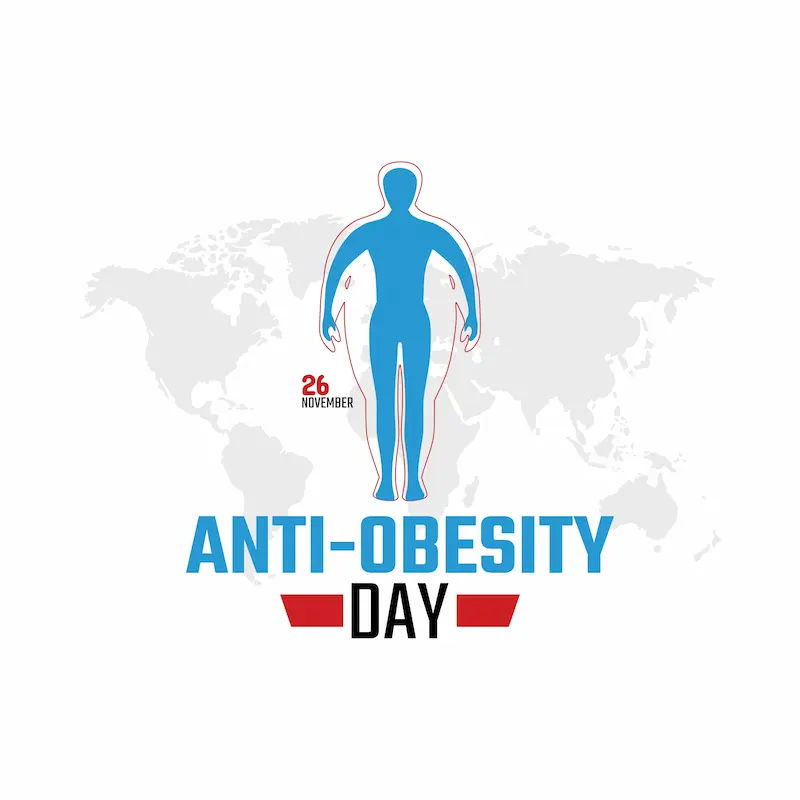Obesity and Health Risks: A Comprehensive Guide
Explore the health risks associated with obesity, including heart disease, diabetes, and more, and learn steps to protect your well-being.

_0.webp?tr=q-80,f-webp,w-350,dpr-2,c-at_max 700w)
Introduction
Obesity is often misunderstood as a simple issue of appearance, but in reality, it's a complex, chronic disease with far-reaching consequences for nearly every aspect of health. The harmful impacts of obesity extend beyond the scale, affecting your physical well-being, mental health, and overall quality of life. This condition, characterised by an excessive amount of body fat, acts as a catalyst for a host of serious medical problems, from heart disease and diabetes to certain cancers and joint disorders. Understanding these risks is the first crucial step toward taking proactive control of your health. In this article, we will delve deep into the multifaceted harmful impacts of obesity, exploring how it strains your body's vital systems, affects your emotional state, and creates social and economic challenges. Our goal is to provide a clear, comprehensive guide that empowers you with knowledge and highlights the importance of seeking support, whether through lifestyle changes or professional medical guidance from platforms like Apollo24|7.
Understanding Obesity: More Than Just a Number on the Scale
While Body Mass Index (BMI) is a common screening tool, a true understanding of the harmful impacts of obesity requires looking deeper. BMI is a calculation based on your height and weight, but it doesn't distinguish between weight from fat, muscle, or bone. This is why it's considered a starting point rather than a definitive diagnosis.
Defining Obesity: BMI and Beyond
A BMI of 30.0 or higher is generally classified as obese. However, healthcare professionals use additional measures to get a complete picture. These include waist circumference, which is a strong indicator of abdominal fat, and body composition analyses. The long-term effects of obesity are closely tied to where your body stores fat, not just the total amount.
The Role of Visceral Fat: The Hidden Danger
Not all fat is created equal. The most significant health risks of being overweight are linked to visceral fat, the deep, internal fat that wraps around your abdominal organs like the liver, pancreas, and intestines. Unlike subcutaneous fat (the fat under your skin), visceral fat is metabolically active. It releases hormones and inflammatory substances that can disrupt your body's normal functions, leading to insulin resistance, high cholesterol, and chronic inflammation. This is why someone with an "apple-shaped" body (carrying weight around the middle) may be at higher risk for metabolic problems than someone with a "pear-shaped" body (carrying weight on the hips and thighs).
Consult a Bariatrician for the best advice
The Physical Toll: How Obesity Affects Your Body's Systems
The physical harmful impacts of obesity are systemic, meaning they can affect almost every organ in your body. The constant state of low-grade inflammation and the mechanical stress of carrying excess weight take a severe toll over time.
Cardiovascular System: Strain on Your Heart
Your heart and blood vessels bear a significant burden. The link between obesity and heart disease is one of the most well-established in medicine.
High Blood Pressure and Atherosclerosis
The extra body fat requires more oxygen and nutrients, forcing your heart to pump more blood. This increases blood volume, which in turn raises pressure on artery walls, leading to hypertension (high blood pressure). Furthermore, obesity contributes to atherosclerosis, a condition where fatty plaques build up inside arteries, narrowing them and increasing the risk of blockages.
Heart Attack and Heart Failure
Over time, this increased workload can cause the heart muscle to thicken and become less efficient, a condition known as heart failure. The combination of high blood pressure, atherosclerosis, and increased strain dramatically raises the risk of heart attacks and strokes.
Metabolic Mayhem: Type 2 Diabetes and Fatty Liver Disease
Obesity is the single most significant risk factor for developing Type 2 diabetes. Excess fat, particularly visceral fat, causes cells to become resistant to insulin, the hormone that regulates blood sugar. As a result, blood sugar levels rise, leading to pre-diabetes and, eventually, Type 2 diabetes. Similarly, Non-Alcoholic Fatty Liver Disease (NAFLD) occurs when excess fat is stored in liver cells. If left unchecked, NAFLD can progress to serious liver inflammation (NASH), cirrhosis, and even liver failure.
Musculoskeletal System: Joint Pain and Osteoarthritis
The skeleton and joints are designed to carry a healthy weight. Obesity-related health risks for the musculoskeletal system are primarily mechanical. Extra pounds place immense stress on weight-bearing joints like the knees, hips, and lower back. This accelerates the wear-and-tear of cartilage, leading to osteoarthritis, chronic pain, and reduced mobility. This often creates a vicious cycle: joint pain makes physical activity difficult, which can lead to further weight gain.
Respiratory Problems: Sleep Apnoea and Asthma
Excess weight around the neck can narrow the airway, making breathing difficult. This is a primary cause of obstructive sleep apnoea, a serious disorder where breathing repeatedly stops and starts during sleep. Obesity is also a major risk factor for developing asthma and can make existing asthma harder to control. The inflammatory state caused by obesity can also affect the lungs directly.
Increased Cancer Risk: The Unseen Link
Many people are unaware of the strong link between obesity and cancer risk. According to the CDC, obesity is associated with a higher risk for 13 types of cancer, including breast (in postmenopausal women), colon, endometrial, oesophageal, and pancreatic cancer. The reasons are complex but involve factors like increased levels of insulin and insulin-like growth factors, chronic inflammation, and higher production of estrogen from fat tissue, which can fuel some cancers.
The Psychological and Emotional Harmful Impacts of Obesity
The consequences are not solely physical. The psychological impacts of obesity can be just as debilitating, affecting self-esteem, mood, and overall mental well-being.
Depression, Anxiety, and Social Stigma
Individuals with obesity often face social stigma, discrimination, and body shaming, which can lead to chronic stress, low self-esteem, and social isolation. This significantly increases the risk of developing mental health conditions like depression and anxiety. The constant pressure to conform to societal beauty standards can take a severe toll on emotional health.
The Vicious Cycle of Emotional Eating
Unfortunately, mental health issues due to obesity can create a self-perpetuating cycle. Feelings of sadness, anxiety, or stress can lead to emotional eating as a coping mechanism, where food is used for comfort rather than nourishment. This, in turn, can lead to further weight gain, deepening feelings of guilt and hopelessness, and worsening the underlying mental health condition.
The Ripple Effect: Social and Economic Consequences
The harmful impacts of obesity extend into social and economic realms. It can affect educational attainment, employment opportunities, and income. Individuals may face weight-based discrimination in the workplace. From a broader perspective, the economic cost of obesity is staggering, encompassing direct medical costs for treating obesity-related diseases and indirect costs from lost productivity.
Taking Control: Steps to Mitigate the Risks
The good news is that even a modest weight loss of 5-10% of your total body weight can significantly reduce the harmful impacts of obesity, improving blood pressure, cholesterol levels, and blood sugar control.
- Focus on Sustainable Habits: Instead of drastic diets, aim for gradual, sustainable changes. Incorporate more whole foods like fruits, vegetables, and lean proteins while reducing processed foods and sugary drinks.
- Move Your Body: Find physical activities you enjoy, whether it's walking, swimming, or dancing. Consistency is more important than intensity.
- Prioritise Sleep and Stress Management: Poor sleep and high stress levels can contribute to weight gain. Aim for 7-9 hours of quality sleep per night and practice stress-reduction techniques like meditation or yoga.
When to Seek Professional Help
If you have tried to manage your weight but haven't seen lasting results, or if you are experiencing symptoms like persistent joint pain, extreme fatigue, or shortness of breath, it's crucial to consult a healthcare professional. They can perform necessary assessments, such as blood tests to check for diabetes or cholesterol issues. Apollo24|7 offers a convenient home collection for tests like HbA1c (for diabetes monitoring) and lipid profiles, making it easier to get a clear picture of your health.
Get Your Health Assessed
Conclusion
The harmful impacts of obesity are profound and multifaceted, touching every corner of an individual's life. From the relentless strain on the cardiovascular system to the heavy burden on mental health, this condition is a significant threat to long-term well-being. However, this knowledge is not meant to incite fear, but to empower action. Understanding these risks is the foundation for making positive changes. Remember, the journey to better health is not about achieving a perfect weight overnight but about making consistent, sustainable choices that reduce your risks and enhance your quality of life. You don't have to navigate this path alone. If you are concerned about your weight or are experiencing any related symptoms, taking the step to consult a healthcare provider is a powerful act of self-care. By addressing the harmful impacts of obesity proactively, you can reclaim control and move toward a healthier, more vibrant future.
Consult a Bariatrician for the best advice
Consult a Bariatrician for the best advice

Dr. Sunil Kaul
General Surgeon
30 Years • MBBS, MS, FICS, FIMSA, FMAS
Delhi
Apollo Hospitals Indraprastha, Delhi
(25+ Patients)

Dr. Aparna Bhasker
Bariatrician
18 Years • MBBS MS
Mumbai
Apollo Hospitals CBD Belapur, Mumbai

Dr. Saket Goel
General Surgeon
27 Years • MBBS, MS (Surg.)
Delhi
Apollo Hospitals Indraprastha, Delhi
(125+ Patients)

Dr. Sreedhara V.
Surgical Gastroenterologist
23 Years • MBBS, DNB, FSGE
Bengaluru
Apollo Hospitals Bannerghatta Road, Bengaluru

Dr. Kiran K J
General and Laparoscopic Surgeon
18 Years • MBBS, MS, FMAS, DMAS (Fellow & Dip in Min. Access surg.), FALS- Bariatric & Robotic Surgery
Bengaluru
Apollo Hospitals Bannerghatta Road, Bengaluru
(50+ Patients)
Consult a Bariatrician for the best advice

Dr. Sunil Kaul
General Surgeon
30 Years • MBBS, MS, FICS, FIMSA, FMAS
Delhi
Apollo Hospitals Indraprastha, Delhi
(25+ Patients)

Dr. Aparna Bhasker
Bariatrician
18 Years • MBBS MS
Mumbai
Apollo Hospitals CBD Belapur, Mumbai

Dr. Saket Goel
General Surgeon
27 Years • MBBS, MS (Surg.)
Delhi
Apollo Hospitals Indraprastha, Delhi
(125+ Patients)

Dr. Sreedhara V.
Surgical Gastroenterologist
23 Years • MBBS, DNB, FSGE
Bengaluru
Apollo Hospitals Bannerghatta Road, Bengaluru

Dr. Kiran K J
General and Laparoscopic Surgeon
18 Years • MBBS, MS, FMAS, DMAS (Fellow & Dip in Min. Access surg.), FALS- Bariatric & Robotic Surgery
Bengaluru
Apollo Hospitals Bannerghatta Road, Bengaluru
(50+ Patients)
More articles from Obesity
Frequently Asked Questions
What is the most dangerous health risk associated with obesity?
While all risks are serious, cardiovascular disease (heart attack and stroke) is a leading cause of death globally, and obesity is a primary driver. The combination of high blood pressure, high cholesterol, and inflammation makes it exceptionally dangerous.
Can you be obese and still be metabolically healthy?
Some individuals may have obesity without immediate signs of metabolic issues like high blood pressure or cholesterol, sometimes called 'metabolically healthy obesity.' However, research shows this is often a temporary state, and the long-term effects of obesity on joints and cancer risk remain, making weight management important for everyone.
How does obesity cause sleep apnoea?
Excess fat around the neck and throat can physically narrow or block the airway during sleep when muscles relax. This causes breathing to repeatedly stop (apnoea) and start, leading to poor sleep quality and low blood oxygen levels.
Are the health risks of obesity reversible?
Yes, to a significant extent. Weight loss can reverse or greatly improve many conditions. For example, losing weight can lower blood pressure, improve cholesterol, reverse pre-diabetes, and reduce the severity of sleep apnoea and joint pain.
What is the first step I should take if I'm concerned about my weight?
The first step is to consult a healthcare professional for an accurate assessment. They can help you understand your personal health risks, rule out underlying medical conditions, and create a safe, personalised plan. You can consult a doctor online with Apollo24|7 for an initial evaluation and guidance.




.webp)

